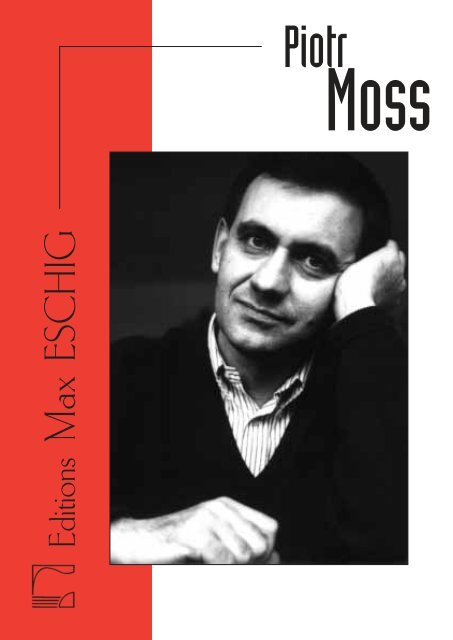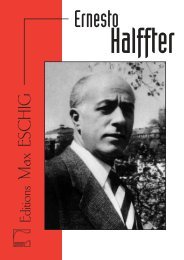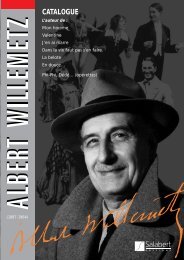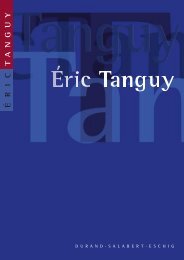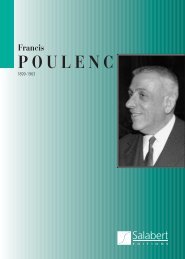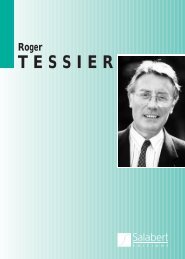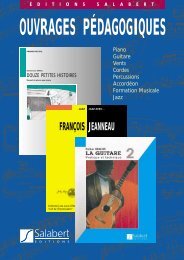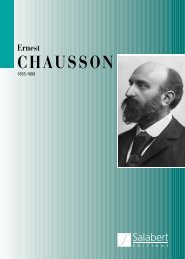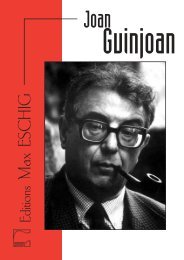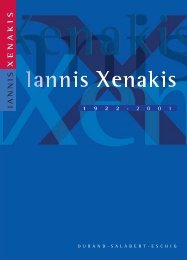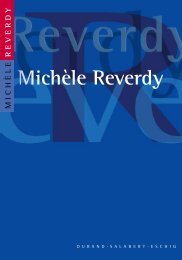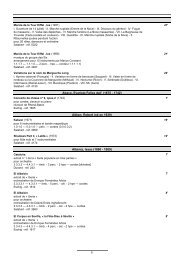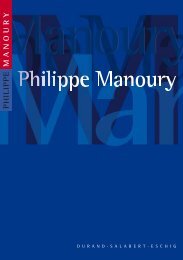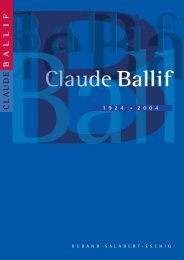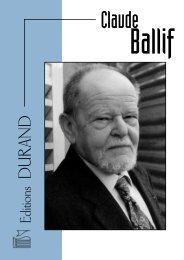Catalogue Piotr MOSS - durand-salabert-eschig
Catalogue Piotr MOSS - durand-salabert-eschig
Catalogue Piotr MOSS - durand-salabert-eschig
You also want an ePaper? Increase the reach of your titles
YUMPU automatically turns print PDFs into web optimized ePapers that Google loves.
Editions Max ESCHIG<br />
<strong>Piotr</strong><br />
Moss
Né le 13 mai 1949 à Bydgoszcz (Pologne).<br />
Etudes de composition avec <strong>Piotr</strong> Perkowski,<br />
Grazyna Bacewicz et Krzysztof Penderecki.<br />
Boursier du gouvernement français en<br />
1976/1977, études avec Nadia Boulanger à Paris.<br />
Depuis 1981, <strong>Piotr</strong> Moss séjourne à Paris.<br />
1977 Prix de l’association des amis de Lili<br />
Boulanger.<br />
1978 1 er Prix du Concours Carl-Maria von<br />
Weber (Dresde) pour Quartetto per quattro<br />
violoncelli.<br />
1 er Prix du Concours<br />
de composition de<br />
Cracovie pour Une poignée<br />
de feuilles de saule.<br />
1979 1 er Prix du ConcoursValentino<br />
Bucchi<br />
(Rome) pour Trois pensées....<br />
Prix Italia pour<br />
sa musique du film polonofinlandais<br />
« Le plus bel endroit<br />
du monde ».<br />
<strong>Piotr</strong><br />
Moss<br />
1980/1981 Lauréat du Prix du Président de<br />
la Radio-Télévision Polonaise.<br />
1982 1 er Prix du Concours<br />
Joan Cererols (Montserrat)<br />
pour Salve Regina.<br />
1985 Prix du Concours de<br />
Composition de Brasilia pour<br />
Stances.<br />
1988 2 e Prix du Concours<br />
de Composition de l’Académie<br />
de Musique Frédéric Chopin<br />
de Varsovie pour Form III.<br />
2 e Prix du Concours<br />
Karol Szymanowski (Varsovie)<br />
pour Veillée.<br />
1 er Prix du Concours organisé par<br />
l’Union des Compositeurs Polonais de Varsovie<br />
pour Trois novelettes.<br />
Depuis 1983 <strong>Piotr</strong> Moss collabore avec<br />
l'écrivain Jean-Louis Bauer. Ils ont déjà écrit<br />
deux mélodrames, Ugui et Le cigne de<br />
Giuseppe ; un oratorio, Gédéon ; deux opéras<br />
de chambre, Karla et Les ailes de Jean-Pierre ;<br />
et un cycle de mélodies pour ténor et orchestre,<br />
intitulé De l'amour….<br />
Février 1998
PIOTR <strong>MOSS</strong><br />
PIOTR <strong>MOSS</strong> — Œuvres<br />
MUSIQUE INSTRUMENTALE<br />
Born 13 May 1949 in Bydgoszcz, Poland.<br />
He studied composition with <strong>Piotr</strong> Perkowski,<br />
Grazyna Bacewicz and Krzysztof Penderecki. A<br />
bursary from the French government enabled him to<br />
study with Nadia Boulanger in Paris (1976 - 1977).<br />
Am 13 Mai 1949 in Bydgoszcz geboren.<br />
Kompositionstudium mit <strong>Piotr</strong> Perkowski,<br />
Grazyna Bacewicz und Krysztof Penderecki.<br />
Stipediat der französischen Regierung; er studiert<br />
bei Nadia Boulanger in Paris.<br />
PETITES HISTOIRES (1982)<br />
Pour basson<br />
16 min.<br />
Lodz, 1987<br />
ME 9023<br />
SOLO Nº2 (1985)<br />
Pour violoncelle<br />
12 min.<br />
Paris, 1987<br />
ME 8748<br />
Since 1981, <strong>Piotr</strong> Moss has lived in Paris.<br />
1977 Prize of the Association des Amis de Lili<br />
Boulanger.<br />
1978 First Prize in the Carl-Maria von Weber<br />
Competition, Dresden, for Quartetto per 4 violoncelli.<br />
First Prize in the Cracow Composition Competition for<br />
Une poignée de feuilles de saule.<br />
1979 First Prize in the Valentine Bucchi<br />
Competition, Rome, for Trois pensées… Prix Italia for<br />
his music for the Polish-Finnish film «The most<br />
beautiful place in the world».<br />
1980 & 1981 Laureate of the Prize of the<br />
President of Polish Radio-Television.<br />
1982 First Prize in the Joan Cererols Competition,<br />
Montserrat, for Salve Regina.<br />
1985 Prize in the Brasilia Composition<br />
Competition for Stances.<br />
1988 Second Prize in the Composition<br />
Competition of Chopin Music Academy of Warsaw for<br />
Form III. Second Prize in the Karol Szymanowski<br />
Competition, Warsaw, for Veillée. First Prize in the<br />
competition organised by the Warsaw Union of Polish<br />
Composers for Trois Novelettes.<br />
The works of <strong>Piotr</strong> Moss have been performed in<br />
most European countries as well as in the USA,<br />
Singapore, Colombia, and South Africa. <strong>Piotr</strong> Moss is<br />
also a producer for Radio France.<br />
Since 1993, <strong>Piotr</strong> Moss has been in collaboration<br />
with the writer, Jean-Louis Bauer. They have already<br />
completed two melodramas: Ugui and Le cirque de<br />
Giuseppe; an oratorio Gédéon; two chamber operas:<br />
Karla and Les ailes de Jean-Pierre; an a song cycle for<br />
tenor and orchestra entitled De l'amour….<br />
— 2 —<br />
<strong>Piotr</strong> Moss lebt seit 1981 in Paris.<br />
1977 wird er mit dem Preis der Lili-Boulanger-<br />
Gesellschft ausgezeichnet.<br />
1978 gewinnt er den ersten Preis des Carl-Mariavon-Weber-Wettbewerbes<br />
in Dresden für sein<br />
Quartetto per Quattro Violoncelli und den ersten<br />
Preis des Kompositionswettbewerbes von Krakau für<br />
Une poignée de feuilles de saule.<br />
1979 gewinnt er den ersten Preis des Valentino-<br />
Bucchi-Wettbewerbes in Rom für Trois pensées und<br />
auch den Prix Italia für seine Musik zu dem polnischfinnischel<br />
Film «Le plus bel endroit du monde».<br />
1980/81 wird er mit dem Preis des Präsidenten<br />
der Polnische Fernseh- und Rundfunkgesellschaft<br />
ausgezeichnet.<br />
1982 gewinnt er den Joan-Cererols-Preis mit<br />
seinem Salve Regina.<br />
1985 gewinnt er einem Preis beim Wettbewerb<br />
von Brasilia für sein Werk Stances.<br />
1988 gewinnt er den 2. Preis der Warschauer<br />
Akademie für Musik Frédéric Chopin für Form III, den<br />
2. Preis des Karol-Szymanowski-Wettbewerbes und<br />
den ersten Preis des Wettbewerbes für Veillée des<br />
polnischen Komponistenverbandes für Trois<br />
novelettes.<br />
<strong>Piotr</strong> Moss arbeitet seit 1993 mit dem Autor<br />
Jean-Louis Bauer zusammen. So entstanden zwei<br />
Melodramen: Ugui und Le cirque de Jean-Pierre,<br />
ein Oratorium: zwei kammeropern: Karla und Les<br />
ailes de Jean-Pierre, außerdem ein Liederzyklus für<br />
Tenor und Orchester unter dem Titel : De l'amour….<br />
MUSIQUE DE CHAMBRE<br />
CINQUE INTERMEZZI (1983)<br />
Pour deux violons<br />
16 min.<br />
Varsovie, 1985<br />
ME 8835<br />
HYMNE (1984)<br />
Pour trompette & orgue<br />
9 min.30<br />
Berlin, 1985<br />
ME 8820<br />
ESQUISSES Nº2* (1984)<br />
Pour trois guitares<br />
12 min.<br />
RID 2124<br />
SUITE (1984/1987)<br />
Pour flûte & piano<br />
14 min.<br />
Paris, 1992<br />
ME 8747<br />
THÈMES VARIÉS (1985)<br />
Pour cor & piano<br />
11 min.<br />
ME 8823<br />
ELEGIA ALEXANDRE TANSMAN<br />
IN MEMORIAM (1986)<br />
Pour deux violoncelles<br />
9 min.<br />
Paris, 1987<br />
ME 8678<br />
— 3 —<br />
DEUX DÉCHIFFRAGES (1988)<br />
Pour saxophone (alto mi b) & percussion<br />
4 min.<br />
ME 8899<br />
SONATE (1990)<br />
Pour saxophone (alto mi b) & piano<br />
21 min.<br />
Berlin, 1997<br />
ME 8821<br />
RAGTIME II (1992)<br />
Pour 8 violoncelles<br />
2 min.<br />
Saint-Céré, 1992<br />
Partition : ME 8881 - Matériel : ME 8882<br />
DUOS (1994)<br />
Pour deux violons<br />
11 min.<br />
ME 9340<br />
FORM XI (1995)<br />
Pour deux saxophones alto (altos mi b)<br />
9 min<br />
Bruxelles, 1997<br />
ME 9436<br />
* <strong>Catalogue</strong> Rideau Rouge
ORCHESTRE [avec ou sans soliste(s)]<br />
CONCERTO-RHAPSODIE (1996)<br />
Pour trombone & orchestre<br />
2(picc)/2/2/2 - 2/0/0/0 - timb - cordes<br />
25 min.<br />
ME 9354<br />
INTRADA (1993)<br />
Pour orchestre<br />
2(picc)/2(CA)/2/2(cbn) - 2/2/0/0 - 1perc - cordes<br />
10 min.<br />
Paris, 1994<br />
ME 8993<br />
Photo Patricia Dietzi


